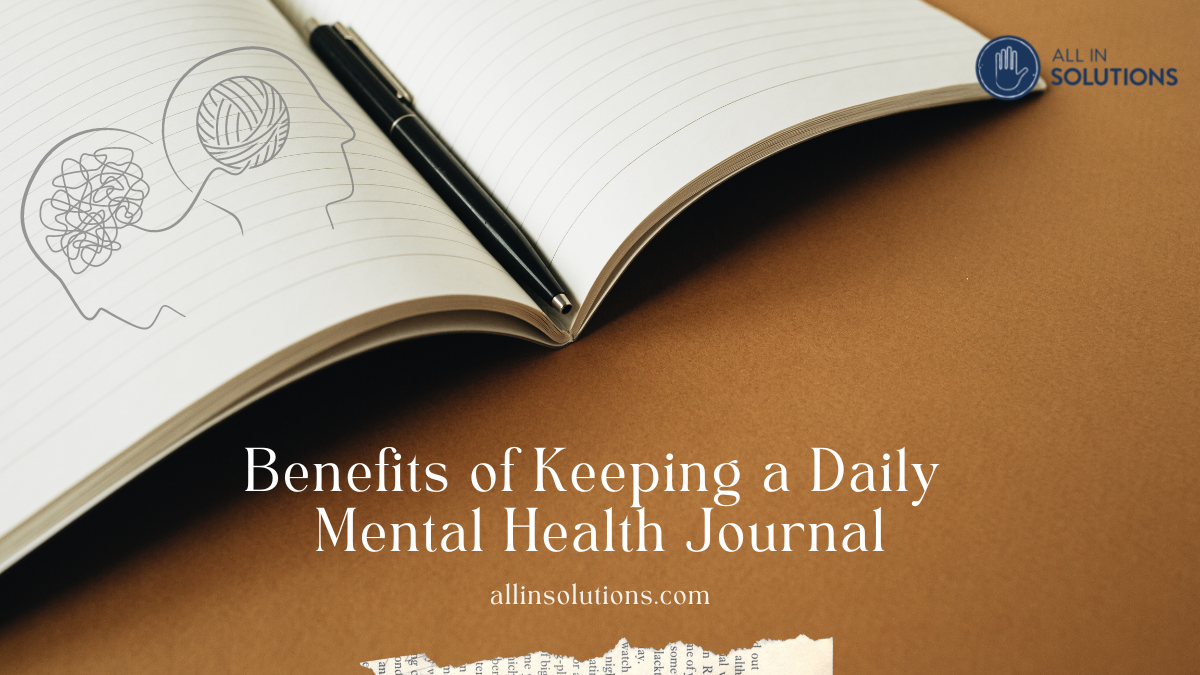Journaling may be a cost-effective and affordable way to manage your mental well-being. Journaling, in its simplest form, is a casual act of writing for personal purposes. Journaling can take many forms, and it is possible for everyone. Journaling is more popular among teens and children than it is for adults. However, adults can still benefit from keeping a journal about their mental health every day.
Why you should keep a daily mental health journal
Everybody needs a safe, constructive way to express themselves. Writing allows you to express yourself in a private, personal way. Journaling can reduce anxiety, promote emotional healing, manage negative thoughts, regulate emotions and help with stress management. These are just a few of the many benefits that keeping a daily journal on mental health can bring.
Decluttering your Mind
Journaling can be very beneficial for clearing your mind and organizing your thoughts. Many people with mental illness experience cycles of negative thinking and confused thoughts that can lead to physical exhaustion. People with anxiety and depression often have trouble sleeping because they worry too much.
Journaling can be used to help you make better decisions and less impulse-driven. Journaling can be used to process difficult emotions and help you deal with worries and concerns. You can also use journaling to help you define and identify your feelings. This is especially important if you are struggling with anxiety or depression.
Give yourself permission to be creative
Journaling is an informal way to express yourself creatively. Journaling allows you to feel at ease with your emotions, such as sadness, anger, exhaustion, or frustration, and can be written down any way that suits you. Talk therapy can be helpful and is often recommended as part of mental health care. However, you might not want to share certain thoughts or emotions with others. Journaling can be a private way to express your feelings and thoughts without judgement.
Focusing on Gratitude
A daily mental health journal allows you to be anonymous and have the space to think freely. It can also help you focus on gratitude and record all the things that you are thankful for. Even if you only have the best of luck, there is always something to be thankful for. Share your joys, triumphs, celebrations and insights.
It is possible to overcome sadness and anxiety by thinking about the people and places that make you happy. This is not an easy task for everyone, but it can be helpful in getting out of depression.
How to Catch Your Triggers
Daily journaling prompts are great for your mental health. It’s almost as if you are reading back a journaling prompt that was written when you were younger, and your greatest dream was to own horses. When we look back at what we have written, we often see how our thoughts and behaviors change.
It is the same for mental illness symptoms. You might notice certain events that happened on days when your symptoms were particularly difficult to manage. You might have been exposed to certain things that can trigger anxiety or depression. This is something you should keep in mind for the future.
Get to know yourself
Mental illness can lead to a loss of affection for the things you love. Depression and anxiety are common symptoms. You may find yourself unable to enjoy the activities you used to love, such as spending time with friends or engaging in hobbies. Many people reach a point in life where they lose the joy of going out to have fun or reading a book.
Food is blander and has less flavor. Journaling can help you to find your way back. You almost have to sit down and write on a blank piece of paper. You can find a voice that you may have lost.
Privacy
We’ve already mentioned privacy as a benefit to journaling for mental well-being. To avoid misunderstanding or judgment, there are many things that we don’t need to or can’t share with others. It’s important that you communicate with your therapist and loved ones. However, it’s also okay to keep your thoughts and feelings private.
Related Reading: How to Handle a Panic Attack at Work
Journal Prompts For Mental Health
You might be asking, “But where do you start?” Here are some prompts to help you start a daily journal for mental health if you are interested in it:
- Write about your day
- Write about what you are grateful for
- Make a list of possible coping strategies.
- Define your goals
- Send a letter to your thoughts
- Describe your emotions and list them
- Description of yourself to a stranger
- Note down the things that you love about yourself
- Send a message to your self to be read on difficult days
Need Help?
All In Solutions offers various dual diagnosis programs that address mental health conditions that may co-occur with substance use disorders. For example, trauma therapy can be extremely useful in helping clients to heal from unresolved emotional wounds they may still carry. In addition, our family therapy program can help clients and their loved ones to improve connection and communication. If you or a loved one are struggling with substance abuse or mental health conditions, don’t hesitate to reach out.
Did you miss our previous article…
https://www.allinsolutions.com/bath-salts-vs-meth/





